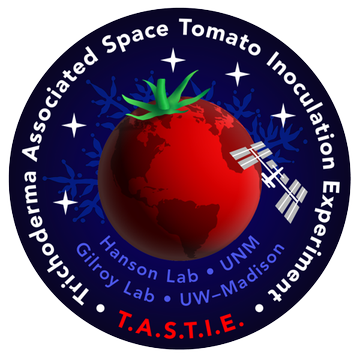Friday, 27 February 2026
UNM team up with University of Wisconsin–Madison send tomatoes into space
The tomatoes have taken flight, on the International Space Station (ISS) as part of project Trichoderma Associated Space Tomato Inoculation Experiment – or TASTIE Researchers from the University of New…

The tomatoes have taken flight, on the International Space Station (ISS) as part of project Trichoderma Associated Space Tomato Inoculation Experiment – or TASTIE
Researchers from the University of New Mexico and collaborating institutions are known for sending unique and unusual plants and vegetables to space. In 2019, they sent green chiles to space, and now, UNM Biology Professor David Hanson and his team have sent tomatoes
“Nutrition is a big issue for astronauts, eating dehydrated food gets old fast and plants are important for mental health,” Hanson said. “Astronauts really like the connection to the earth that plants provide. What is exciting is that a lot of science is needed to learn how to grow plants efficiently and reliably for future space missions.”
The Trichoderma Associated Space Tomato Inoculation Experiment (TASTIE) has taken flight on the International Space Station (ISS), carrying tomatoes as part of the project. This experiment aims to explore how plants grow in the absence of gravity and to develop ways to help them cope with the stressors of space flight. Researchers hope that this study will provide valuable insights into plant growth and development in space.
“Plants know up from down, right? They don’t have a brain or anything like that, but shoots grow upwards, and roots grow downwards. They are using directional information,” said Professor Simon Gilroy, University of Wisconsin-Madison.
Researchers explain that when gravity is removed from the equation, everything gets complicated. The team, which includes UNM researchers who are part of UNM’s Grand Challenge Sustainable Space Team, hopes the fungus they’re sending up along with the tomatoes will be a game changer. The fungus, Trichoderma, is one of the most prevalent fungi in all kinds of soils. On Earth, the fungus is known to be beneficial for plant growth, making plants grow hardier for later encounters with threats and stressors.
“The role of UNM scientists is to determine if the fungus affects how the tomatoes use water and CO2 to grow better. The capabilities at the UNM Center for Stable Isotopes will be critical for measuring properties of the air on the space station and comparing that with the plant tissues when they return to Earth,” Hanson said.
Technology
Ingredion Thailand Achieves 100% Sustainably Sourced Cassava
Feb 27, 2026 | Company News
Deakin University and Bellarine Foods Partner to Develop Sustainable Marine-Derived Proteins
Feb 26, 2026 | Australia
Royal Unveils Refreshed Jute Bag Design for 20lb Authentic Basmati
Feb 25, 2026 | Company News
Food Testing
Australian Medical Bodies Push for Compulsory Health Star Labelling
Feb 24, 2026 | Australia
Tim Hortons Singapore Secures Majlis Ugama Islam Singapura Halal Certification Ahead of Ramadan
Feb 23, 2026 | Company News
More Popular
Fagron Acquires Pharmavit Europe for €68Mn to Expand Nutraceutical Portfolio
Feb 27, 2026 | Company News
Arla Foods Invests EUR 300Mn in New Cheese Dairy in Sweden
Feb 27, 2026 | Company News
Beyond Meat Broadens Portfolio Beyond Protein with Sparkling Plant-Based Drink Line
Feb 27, 2026 | Beverages






